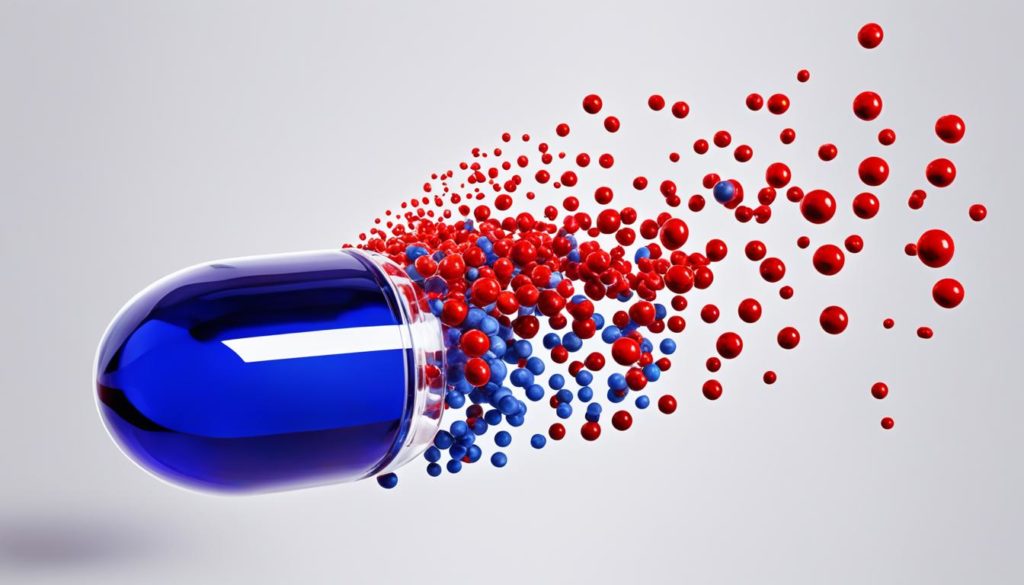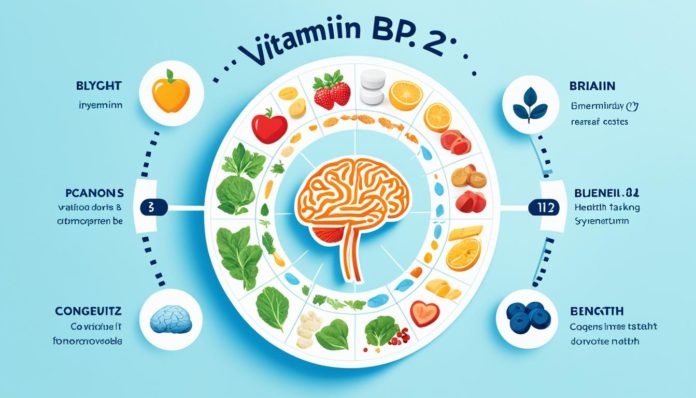Vitamin B12, also known as Cobalamin, is a crucial nutrient for health. It helps form red blood cells and supports our brain. Knowing about B12 helps you choose the right foods and supplements to stay healthy.
This guide talks about the many benefits of Vitamin B12. It also covers where to find it and what causes a lack of B12. By learning about Vitamin B12, you can make sure you’re getting enough every day. This helps keep your body working well.
For more info on vitamins and their benefits, check out this resource. It has lots of good details.
Key Takeaways
- Vitamin B12 is essential for red blood cell formation and neurological health.
- Cobalamin plays a critical role in energy production.
- Understanding the different forms of Vitamin B12 ensures optimal intake.
- Daily recommended allowances for Vitamin B12 vary by age and health status.
- Being aware of common causes and signs of deficiency can aid in prevention.
- A balanced diet includes key sources of Vitamin B12, both animal and plant-based.
- Consulting a healthcare provider for supplements or injections ensures appropriate B12 intake.
Introduction to Vitamin B12
Vitamin B12, known as Cobalamin, is crucial for our bodies. It helps make red blood cells, keeps the nervous system healthy, and is needed for creating DNA. Learning about this vitamin shows us how important it is for our health.
What is Vitamin B12?
Vitamin B12 is a water-soluble vitamin essential for our brain and nerves. It’s the only vitamin that contains cobalt, a metal. B12 is needed for protecting nerves and making our genetic material.

History and Discovery
The discovery of Vitamin B12 started in the early 1900s. Thomas Addison first identified pernicious anemia in 1849. Then, in the 1920s, scientists showed that eating liver could treat this anemia.
Chemists Karl Folkers and Alexander Todd later extracted B12 from liver in the 1940s. Their work, which helped define Cobalamin’s structure, won a Nobel Prize in 1934. This was a big step forward in nutrition science.
This discovery led to supplements and fortified foods to fight B12 deficiency. It showed the world B12’s crucial role in maintaining our health.
Health Benefits of Vitamin B12
Vitamin B12 plays a key part in many body functions. It’s important for making red blood cells, keeping nerves working right, and helping you have energy.

Role in Red Blood Cell Formation
It helps make and improve red blood cells. Without enough B12, you can get a kind of anemia where cells are too big and don’t work right. This shows why the right amount of B12 matters for your health.
Neurological Health
B12 is crucial for your brain and nerves. It helps make a protective layer for nerve fibers, aiding in sending messages smoothly. Not having enough B12 can affect your memory and could lead to serious brain issues.
Energy Production
For turning food into energy, B12 is vital. It changes carbs into glucose, which powers your body. So, getting enough B12 boosts your energy and keeps you feeling good. This helps your body make and use energy well.
To learn more about important minerals and health, visit Calcium: An Essential Mineral for Strong Bones and.
Scientific Support for B12 Health Benefits
| Health Benefit | Scientific Support |
|---|---|
| Red Blood Cell Formation | Prevents megaloblastic anemia and supports healthy red blood cell production. |
| Neurological Function | Supports the synthesis of myelin and proper nerve communication. |
| Energy Metabolism | Essential co-factor in the conversion of carbohydrates into glucose for energy. |
Vitamin B12 (Cobalamin) Forms
Vitamin B12, also known as cobalamin, comes in different forms. Each form has its own benefits and features. The most common cobalamin forms are Methylcobalamin and Cyanocobalamin.
Methylcobalamin is found naturally in the body. It’s easy for the body to use this type of Vitamin B12. It’s great for the brain and nerves. Cobalamin forms like Methylcobalamin are in supplements to help with memory and thinking.
Cyanocobalamin is man-made and not immediately used by the body. But, it turns into active B12 after we eat it. This form is cheap and stable, often found in foods and vitamins. It helps to prevent B12 shortages and keeps us healthy.
Health supplements often have Cyanocobalamin. It’s easy to make and common for buyers.
Here is how Methylcobalamin and Cyanocobalamin compare:
| Attribute | Methylcobalamin | Cyanocobalamin |
|---|---|---|
| Source | Natural | Synthetic |
| Bioavailability | High | Moderate |
| Stability | Low | High |
| Cost | High | Low |
| Common Use | Neurological health supplements | General vitamin supplements |
Each cobalamin form is key for good health. Your choice depends on what your body needs. Knowing about these forms helps choose the right Vitamin B12 for your diet or vitamins.
Importance of Vitamin B12 in Daily Diet
Vitamin B12, also known as cobalamin, is key for our health. It helps make red blood cells and keeps the nervous system healthy. Getting enough B12 every day is important to avoid health problems.
The Recommended Dietary Allowances (RDAs) for Vitamin B12 change with age, lifestyle, and health. Knowing these recommendations helps people choose the right foods to meet their needs.
Recommended Dietary Allowances
Health experts have set RDAs for Vitamin B12 to make sure everyone gets enough. Adults need about 2.4 micrograms a day. Pregnant and breastfeeding women need more, about 2.6 and 2.8 micrograms, to stay healthy.
Daily Intake Needs
Different people need different amounts of Vitamin B12. For example, older adults might need more because their bodies don’t absorb it as well. Pregnant women also need more to help their babies grow right. Following these guidelines helps everyone get the nutrients they need.
It’s important to eat B12-rich foods like meat, fish, dairy, or fortified cereals. Some people might need supplements, especially if they can’t eat certain foods or have special health needs. This helps make sure they get their daily B12.
Common Causes of Vitamin B12 Deficiency
Understanding what leads to Vitamin B12 deficiency is key for good health. Two main factors play a role: what we eat and our health conditions.
Dietary Restrictions
Limited diets can cause a lack of B12. This is especially true for vegans or vegetarians. B12 is mainly in animal products.
Without eating fortified foods or taking supplements, getting enough B12 is hard. This makes paying attention to diet important.
Health Conditions
Some health issues make absorbing B12 difficult. Disorders like Crohn’s disease, celiac disease, and pernicious anemia are examples. They impact how well the body can take in nutrients, including B12.
People with these conditions need to focus more on their B12 levels. They might need to eat more foods with B12 or take supplements.
| Cause | Description | Potential Impact |
|---|---|---|
| Dietary Restrictions | Limited consumption of animal products | Increased risk of deficiency without supplementation |
| Health Conditions | Gastrointestinal disorders and autoimmune diseases | Impaired absorption of Vitamin B12 |
Signs and Symptoms of B12 Deficiency
Knowing the signs and B12 deficiency symptoms is key to staying healthy. Common signs include feeling tired, weak, and having anemia. In serious cases, people might face issues like memory loss or finding it hard to focus.
Cobalamin deficiency indicators might not be clear at first but get worse if not treated. Being constantly tired and feeling dizzy often are warning signs of B12 shortage.
Signs on the body include looking pale or yellow, mouth sores, and walking unsteadily. Spotting these signs early can stop severe problems and make life better.
- Fatigue and weakness
- Neurological problems
- Memory loss
- Pale or jaundiced skin
- Mouth ulcers
- Walking issues
Seeing a doctor if you have many symptoms of B12 shortage is vital. Catching and treating it early prevents worse issues and leads to a healthier life.
| Symptom | Description |
|---|---|
| Fatigue | Feeling very tired and having no energy |
| Anemia | Not enough red blood cells, causing weakness |
| Neurological Symptoms | Forgetting things, hard time focusing |
| Skin Changes | Looking pale or yellowish |
| Mouth Ulcers | Hurting spots in the mouth |
| Mobility Issues | Having trouble walking steadily |
Best Food Sources of Vitamin B12
It’s vital to eat foods rich in B12 for your health. This part shares different B12 food sources. There are choices for everyone, whether you eat animal products or stick to plants.
Nutrient-Rich Foods
If you eat animal products, you have many great B12 sources. Meat, fish, dairy, and eggs are filled with Vitamin B12. This vitamin is key for making red blood cells and keeping your nerves healthy.
| Food | Vitamin B12 Content per 100g |
|---|---|
| Beef Liver | 83.1 µg |
| Clams | 98.9 µg |
| Salmon | 4.2 µg |
| Milk | 0.5 µg |
| Eggs | 0.9 µg |
Plant-Based Sources
Finding plant-based B12 sources can be tough for vegetarians and vegans. B12 mainly comes from animal products. But, certain fortified foods are a good fix. They have added B12 for those on plant-based diets.
Fortified foods like nutritional yeast and plant milks are good for vegans. Breakfast cereals and meat substitutes also help. Eating these foods daily ensures enough B12 intake.
- Nutritional Yeast: A versatile ingredient often used to mimic the flavor of cheese in vegan dishes.
- Fortified Plant Milks: Commonly found varieties include almond, soy, and oat milk.
- Fortified Cereals: Many breakfast cereals are enriched with Vitamin B12.
- Meat Substitutes: Fortified with B12, these can serve as an alternative to traditional meat products.
Mixing B12-rich foods with fortified options ensures a balanced diet. This way, everyone gets the nutrients they need, avoiding B12 deficiency.
Vitamin B12 Supplements: Pros and Cons
Vitamin B12 is key for many body functions. If you can’t get enough from food, B12 supplements help. In this section, we look at the good and bad of B12 supplements. We also give tips on picking the best option for you.
Types of Supplements
B12 supplements come as tablets, lozenges, and liquids. Tablets are popular and easy, often suggested by doctors for those lacking B12. Lozenges and liquids are good for people who struggle with pills. They get absorbed faster.
There’s also the sublingual type, dissolving under the tongue for quick absorption. Every form has its pros and cons. It’s important to know these before you start taking B12 supplements.
How to Choose the Right Supplement
Picking a B12 supplement can be tough with all the choices out there. Here are some tips:
- Dosage: The amount you need depends on your age, health, and diet. A healthcare provider can help with this.
- Form of Cobalamin: Methylcobalamin and cyanocobalamin are common types. Methylcobalamin is better absorbed but cyanocobalamin is more stable and cheaper.
- Health Needs: Some health issues need specific B12 types. Talk to a doctor about your needs.
For more details on B12 supplements, check out this guide.
See this table for a quick comparison of B12 supplement types:
| Supplement Type | Pros | Cons |
|---|---|---|
| Tablets | – Convenient – Widely available | – Slower absorption – May cause stomach upset |
| Lozenges | – Faster absorption – Easy to take | – More expensive – May taste unpleasant |
| Liquids | – Highly absorbable – Flexible dosage | – Shorter shelf life – Requires measuring |
| Sublingual Tablets | – Rapid absorption – No need for swallowing | – Limited availability – May cause irritation under the tongue |
The Science Behind Vitamin B12 Shots
Vitamin B12 shots are gaining attention for quickly tackling vitamin deficiencies. They are given directly into the muscle. This method skips the digestive system, allowing B12 to enter the bloodstream fast. It’s great for people with absorption problems or those who need B12 quickly. Learning about B12 shots can help you decide if they’re right for you.
Who Needs Vitamin B12 Injections?
People with pernicious anemia benefit from B12 injections. This condition stops the body from making a protein needed for B12 absorption. Those with gut issues like Crohn’s disease or celiac disease, and those who’ve had bariatric surgery also face B12 absorption challenges. Even vegetarians and vegans can improve their health with these injections, as plants don’t offer much B12.
Benefits Over Oral Supplements
B12 injections have several advantages over pills. They get into your system quickly and at higher levels. This is perfect for anyone with serious deficiencies or absorption problems. The injections can ease symptoms like tiredness and weakness faster, boosting health sooner. Plus, they don’t cause the stomach issues that high-dose pills might.
FAQ
What is Vitamin B12 (Cobalamin)?
Vitamin B12, or Cobalamin, is important for making red blood cells and keeping nerves healthy. It also helps with creating DNA and energy in our bodies. This vitamin is essential for our overall health.
What are the health benefits of Vitamin B12?
Vitamin B12 helps make red blood cells and supports our brain. It also boosts our energy and stops certain health problems like anemia. Everyone needs enough B12 for good health.
What are the different forms of Vitamin B12?
B12 comes in forms like Methylcobalamin and Cyanocobalamin. Methylcobalamin is natural and found in animal foods. Cyanocobalamin is made in labs and used in vitamins. Each type has its own benefits.
What are the recommended dietary allowances for Vitamin B12?
Adults should get 2.4 micrograms of B12 each day. Pregnant and breastfeeding women need more. This keeps our bodies working right.
What are common causes of Vitamin B12 deficiency?
Not eating animal products, certain health problems, and some medicines can lead to low B12. It’s important to know these causes to avoid deficiency.
What are the signs and symptoms of Vitamin B12 deficiency?
Low B12 can cause tiredness, weakness, and anemia. Numbness in hands and feet, memory issues, and mood changes can also happen. Catching and treating it early is key.
What are the best food sources of Vitamin B12?
Animal foods like meat, fish, and dairy are high in B12. Vegans can choose fortified plant milks and cereals. These foods help us get enough B12.
What are the pros and cons of Vitamin B12 supplements?
Supplements ensure we get enough B12, which is great for people who don’t eat animal products or have absorption problems. But, picking the right type and dose is important for our health.
Who needs Vitamin B12 injections and what are their benefits?
People with serious B12 problems may need shots. The shots put B12 directly into the blood, helping symptoms fast. This method is especially helpful for those with severe deficiencies.


